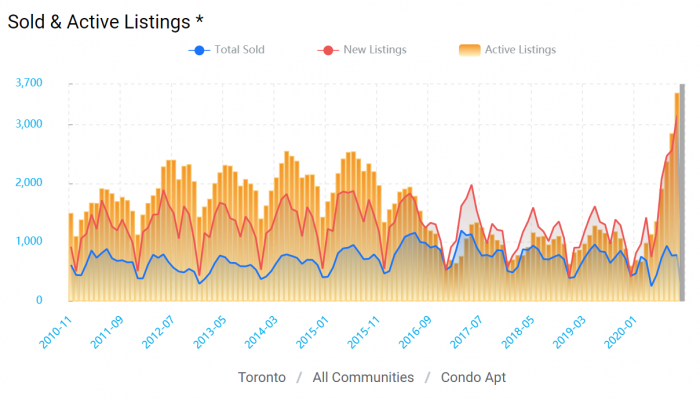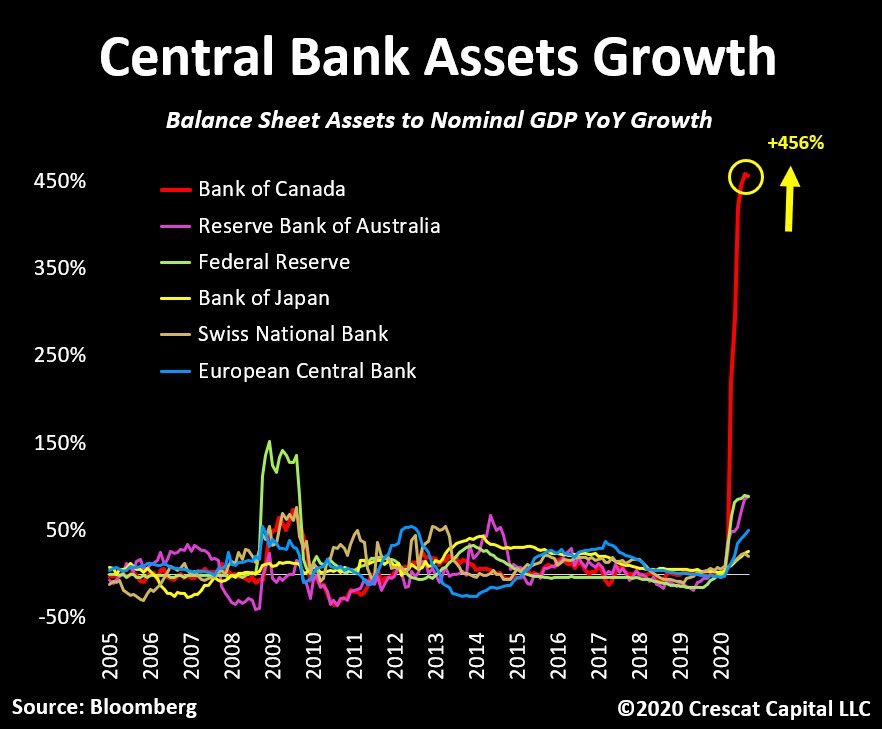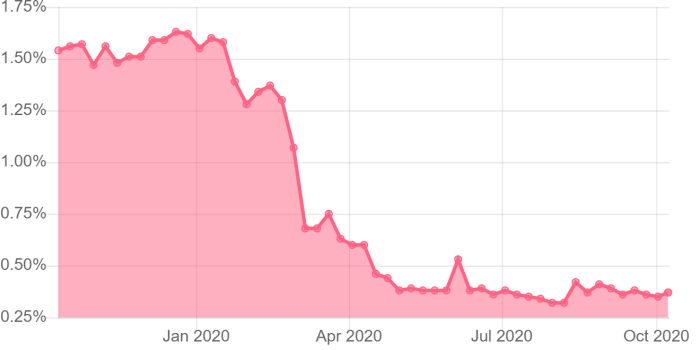—The Mortgage Report: Oct. 7—
- Toronto condo listings have exploded 215% to a record high, reports Bloomberg. And they’re projected to be even higher in October, according to HouseSigma.
- Driving that surprising number:
- skittish investors (many with negative cash flow given surging rental listings and a 14% y/y drop in rents)
- “elevator phobia”
- people coming off mortgage deferrals
- relatively higher unemployment among condo dwellers
- office-liberated workers ditching the city for bigger, greener spaces, and
- the damaging self-reinforcing psychology of surging listings.
- It’s like that tropical storm in the Atlantic. You see it building and wonder if it can become a Cat-5. Well, the winds are picking up and lenders are risk averse. If urban condos depreciate more from here, more appraisals will undershoot expectations and lenders will underwrite mortgages secured against such properties noticeably more conservatively. “…We do see things softening enough to drive condo prices down,” RBC economist Robert Hogue told the Globe recently.
- In other words, if you own a big-city condo downtown, plan to keep it for a while, are contemplating refinancing and need to borrow the full 80% of your property value, contemplate quicker. If condo values dive (which is not a prediction, but a real possibility) your loan amount could dive with them.
- So far, major brokers we talk to like Monster Mortgage’s Vince Gaetano, Butler Mortgage’s Ron Butler and Sigma Mortgage’s Shawn Stillman, say they’re not seeing serious appraisal trouble or credit tightening on condos yet. Although:
- Gaetano notes, “Appraisers are a little hesitant on refinances, but are less worried on purchase values.”
- Stillman says some lenders are now scrutinizing condo status certificates more upfront. They’re trying to spot anything that could adversely impact resale value if a client defaults, like low reserve funds or potential/pending lawsuits.

Lots of Buyers Holding Off
- According to the 2020 Scotiabank Housing Poll:
- 32% of younger Canadians are waiting for prices to drop in the next six to 12 months before making a home purchase.
- 38% of Canadians believe now is a good time to buy a new home.
- 42% of homeowners looking to buy a new property say they’ll use equity from their existing primary home to do it.
More Warning Bells From Siddall
- The head of Canada’s housing agency will tell anyone that listens about how risky Canadian real estate is. CMHC President and CEO Evan Siddall talked to Mortgage Professionals Canada on Tuesday. Among his statements:
- Canadian home prices “bear no relationship to underlying economics.”
- “Trees don’t grow to the sky.”
- “Trust me, this game of musical chairs ends and the last people standing are these folks loaded with debt.”
- “If you think this all ends well, go to Detroit.”
- “The thing that causes people to lose their homes is unemployment…So, the fact that they can currently service their debt is irrelevant to whether they’re going to have a foreclosure or not…The real issue is their vulnerability to unemployment.”
- Mortgage brokers provide “more value” than Realtors and are “essential to our real estate markets.”
- A quick comment on this one: Siddall is no friend of the real estate complex and vice versa. Hopefully his successor is less inclined to throw the entire profession under the bus, as that’s a disservice to Realtors who don’t over-hype real estate, are honest with their clients and work in their best interests.
- As just one little example of a fiduciary Realtor, earlier this year, this author bought a property. Our Realtor negotiated an additional $20,000 off the price after the deal was signed, something we could not have done without her. That saved the equivalent of five years of mortgage interest. That’s more than any mortgage broker could have saved us. The point: the right Realtor can add tremendous value.
- On the other hand, casual or inexperienced real estate agents in no way justify 4-6% commissions—whether those fees are paid out of pocket or baked into a home’s price. And yes, one could say something similar about greenhorn/part-time mortgage brokers.
- Separately, Siddall noted that CMHC will be advising the Finance Minister and Minister of Families, Children and Social Development on the proposed revision to the First Time Home Buyer Incentive. This proposal boosts buying power for young buyers, running counter to what Siddall’s been preaching.
RBC Capital Markets on Mortgage Deferrals
- In a report Tuesday, RBC analyst Darko Mihelic shared new insights on Canada’s mortgage deferral quandary:
- “Currently 11% of mortgage borrowers in Canada are not making mortgage payments, about 17 times higher than the worst mortgage delinquency rate in the last 30 years…”
- “We believe 10% to 15% of mortgage borrowers on deferral are unemployed,” he wrote.
- “We believe 10% to 20% of mortgages under deferral are at a higher risk of defaulting” implying a mortgage delinquency rate up to 2.3% when deferrals end.
- RBC does not, however, expect an arrears rate near 2.3%, in part because of:
A) government income support programs, and
B) “cash stockpiling” — i.e., deferring borrowers have “likely” saved up 4+ months of mortgage payments on average, RBC estimates. - “We believe mortgage impairments have been pushed out to Q3/21 maybe even Q4/21,” RBC concludes, citing enhanced Employment Insurance (EI) and the new Canada Recovery Benefit as two reasons not to panic.
Central Banks Dominate Rate Markets
- The 5-year government bond yield, which guides fixed mortgage rates, remains in a remarkably tight trading range. We’ve never seen anything like it in 13 years of covering the bond market.
- Much of the flatness is thanks to the Bank of Canada, which has been buying 5-year bonds without taking a breath. The Bank is doing this largely to keep mortgage rates down.
- With all it’s buying, a CIBC report we read Wednesday suggests the BoC will own virtually half the 5-year government bond market by spring.
- Such constrained movement (i.e., extremely low volatility) can only mean one thing. Once there’s a significant surprise in the inflation outlook, fiscal outlook, Canada’s credit outlook or the Bank of Canada’s bond buying intentions, rates will vigorously uncoil. We just don’t know if they’ll uncoil to the upside…or downside.

Oil Not Coming Back: BP
- If you’re looking for more evidence to support a long-term low rates thesis, BP’s opinion is worth considering. It’s the first oil supermajor to pronounce that global petroleum demand growth has peaked.
- If that proved true, it would be inarguably bearish for domestic mortgage rates (other things equal) given how vital energy is to Canadian GDP.

 log in
log in


12 Comments
I don’t see Toronto condos bottoming until later next year when immigration and AirBNB come back to normal. Once all these investors realize what’s happening there could be a stampede to the exit. I’m not sure if there will be a crash but I think price risk is definitely imminent.
Units under 500-600 square feet will probably get smoked. I could see lenders requiring them all to be CMHC insured.
If even 10% of deferrals go into arrears wouldn’t that mean that over 1% of mortgages go into foreclosure?
It’s best to recall that Mr. Evan Siddall received little to no support from the finance department or the banks or anyone else, for that matter, for his rogue policy changes that resulted in a profound market share decline for CMHC.
He and his Crown Corporation have also come under some blistering criticism for what has proven to be some truly terrible real estate analysis and laughable predictions back in May.
Mr. Siddall may be feeling a little wounded.
His imaginary “battle” with realtors puts one in mind of a grade-schooler attempting to provoke a fight and then sticking out his chin.
Ok, here goes: That the CEO of the Canadian Mortgage and Housing Corporation has devolved into a cliche-spewing, fear-mongering child is of little surprise at this point.
There satisfied?
Siddall equating Canadian fundamentals to Detroit’s fundamentals show how unfit he is to lead Canada’s housing agency.
So let me get this straight: you are recommending to refi your condo now in order to get the largest loan possible, yet knowing a decline in value is virtually certain and a large decline in value a distinct possibility. This would seem to leave the owner in a vulnerable situation since it is highly likely they will be a prisoner to that lender and unable to switch since the LTV would be over 80 and no regulated lender could take it. Taking the largest loan just before the value of the asset tanks is the type of advise that leads to many face palms in Ottawa.
Hey David,
That’s a fair question and thank you for asking it.
The advice is sound for someone who wants to keep their condo, for these reasons:
1. No one knows if there will be a large decline, such that prices drop so much (20%+) that there’s not enough equity, principal paydown and/or savings to pay out the loan and realtor fees.
2. If a borrower *needs* to refinance, particularly for financial reasons, they’re better off taking their chances with future home values than not being able to pay their bills.
3. If someone is refinancing to reset their rate lower, future values are essentially irrelevant.
So if this strategy causes face plants with our trusty regulators, it’s only because they’re not contemplating the borrower’s real-life alternatives…which aren’t as favourable.
Any timeline for the revision to FTHBI? Cannot wait to see the detail.
I’d hate to own a 5 year bond once the market gets a whiff of above-target inflation. There will be no bids for 50+ basis points.
Evan is not wrong. If someone in 2006 said US housing market is fundamentally flawed and asked people to watch out for their debt level, will you mock that person because the housing price continues to skyrocket for the next 1.5 years?
@Wall Street Investor: Whataboutisms, analogies and 20/20 hindsight amount to a very weak defence of Mr. Siddall’s analysis and forecasts.
He and his team made very specific forecasts regarding the direction of the market and building starts, which were way off the mark.
He now explains that the forecasts were “path-dependent” which is jargon for – “this is the direction we thought it was heading.”
He and his analysts chose the wrong path and were wrong. An admission of such is warranted. Not an altered prediction couched in the guise of rationalization and deceit.
It’s so easy to be made a fool of by this real estate market.